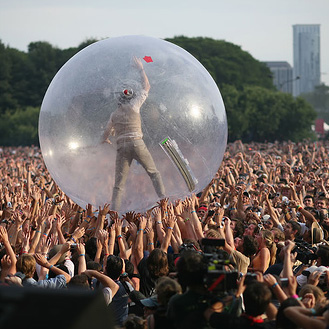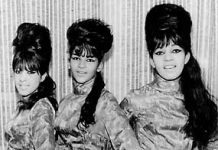There
is no denying that getting up on stage in front of adoring thousands, or even
a rabid base of high school friends, might over time build a bit of conceit.
The warm adulation of the crowd is ever so intoxicating, so much so that acts
we all know that should have given up the road years ago, keep on going. They’re
still at it, as much for the tickle of applause and the hot lights as the money.
And though most rock stars’ pose, play and camp it up — the examples
below are when I feel they are overdoing it. These are the top 10 rock and roll
conceits…
1) Air guitar – Never, on any occasion, should anyone play
air guitar — especially real musicians. The guitarist in your band doesn’t
need the singer or the horn player sidling up during a solo and fake playing
what he is playing for real. It should be noted that women playing air guitar
render all Cialis® ineffective.
2) Calling out your own solo – Unless you’re Mark Knopfler,
who has been known to utter a few “here we go’s,” one should
never point out a solo they are about to perform. Other than maybe stepping
into the spotlight or standing atop a wall, you should not let your audience
know you are about to do anything special other than by just by doing that special
thing. It’s OK though for another band member to throw attention your
way. Jim Morrison telling the amazing Robby Krieger to “do it… do
it Robby” was perfectly fine.
3) Referring to your past work In a current work – Even Pete
Townshend gets a slap on the wrist for this one. In the Who’s “You
Better You Bet,” Roger Daltrey sings “to the sound of old T-Rex…and
Who’s Next.” While I love Who’s Next
and can’t think of a better album to reference, I have to wonder —
should the Who reference their own material? How about naming your album, your
band and your single all the same. You know, like Icehouse did on their song
“Icehouse” that appears on their album…yeah you guessed it
— Icehouse (non-Australian printing).
4) Referring to your tune as “beautiful,”
“inspiring,” “important,” etc. – You don’t
get to comment on the quality of a song if you wrote it. Avoid telling us how
important it is. Just sing it. I reserve the right for saying if it is all that
good.
5) Thanking God – God doesn’t care that you won a Grammy.
6) Dancing – This is a tricky one. Some rock musicians dance
quite well and this is part of their stage act. What we don’t want though
is somebody dancing to their own band and mugging it up so much they are calling
attention to their dancing. If you’re that good of a dancer and this is
part of your performance (think Prince). Then just twirl, cut-a-rug and keep
me amazed by your antics. But don’t let me in on the fact that you think
your moves are so amazing.
7) Playing to the screen only – I have bemoaned the state
of live performance ever since MTV came on the scene, and this conceit is a
direct result of music television’s intervention in our culture. Used
to working in video and playing to a small screen, some musicians born and bred
in the video era tend to work a big stage as if they are still on TV. What doesn’t
help, of course, is that now we have those mega screens that blast images throughout
a stadium. And we have a lot of people attending shows these days who would
rather record what they see on their phones than watch the actual show. This
may lead to the conclusion that performers know they really only ever have to
play to the first few rows and the cameras.
8) Dress up – I get it, you’re just
like me, you’re a working-class band, you’re grunge. But dude, if
I have plunked down the princely sums to see your band, give me a little in
the dressing-up department. If your look is scruffy jeans and work boots, then
by all means rock that style (or lack of it). But don’t go out of your
way to dress down. The frocks and beads work well when one’s audience
is half a football field away.
9) List the players – I want to know who played on the album.
If you’re using studio players, guest stars or even friends, give them
a nod. Don’t be so conceited that it can only be you listed on your work
when we all know (and will most certainly find out) who played on what. Also,
those bands using those extra musicians live but placing them off-stage (and
those boys from “Beantown,” you know who you are), bring them up
front. Side men are important and we know they are there anyway.
10) Banking on the name – This one I just heard about recently
and it so heinous I can barely get my mind around it. I have been bitching about
bands touring under their old names when there are hardly, if any, original
members left. I don’t know what the percentage of original-to-new players
has to exist to still call the band the old name, but if the entire band is
new guys, isn’t the band now a cover band? I reference (and won’t
use any names) something I recently heard where a popular band, started in the
late 60s, grown to prominence and fame in the 70s, maintaining some hits into
the 80s and 90s, are touring today as a outdoor shed staples and use stand-ins
for original members when those older members are not feeling up to playing.
And though the occasions of this happening are rare, I have it from a pretty
good source that there are nights when all the stand-ins and newer guys are
the only ones playing. On those nights, you just paid the babysitter, bought
the tickets, and braved the crowds and elements to see a — cover band!




















